The Samsung 860 QVO (1TB, 4TB) SSD Review: First Consumer SATA QLC
by Billy Tallis on November 27, 2018 11:20 AM ESTAnandTech Storage Bench - Heavy
Our Heavy storage benchmark is proportionally more write-heavy than The Destroyer, but much shorter overall. The total writes in the Heavy test aren't enough to fill the drive, so performance never drops down to steady state. This test is far more representative of a power user's day to day usage, and is heavily influenced by the drive's peak performance. The Heavy workload test details can be found here. This test is run twice, once on a freshly erased drive and once after filling the drive with sequential writes.
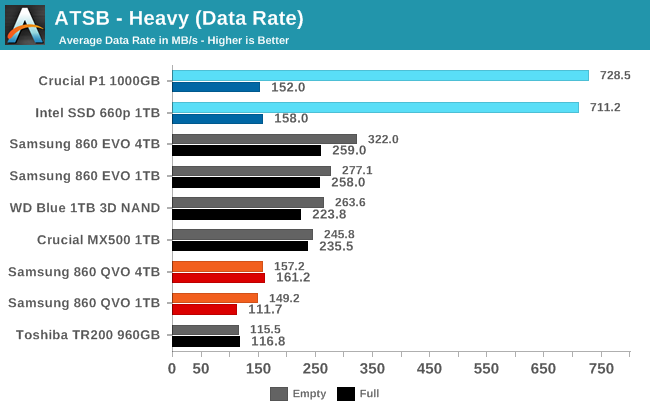
Neither capacity of the Samsung 860 QVO can keep pace with the mainstream TLC drives on the write-intensive Heavy test, but they both outperform the DRAMless TLC drive. The NVMe+QLC drives from Intel and Micron fare much better when the test is run on an empty drive, but when full they too fall behind the mainstream TLC SSDs.
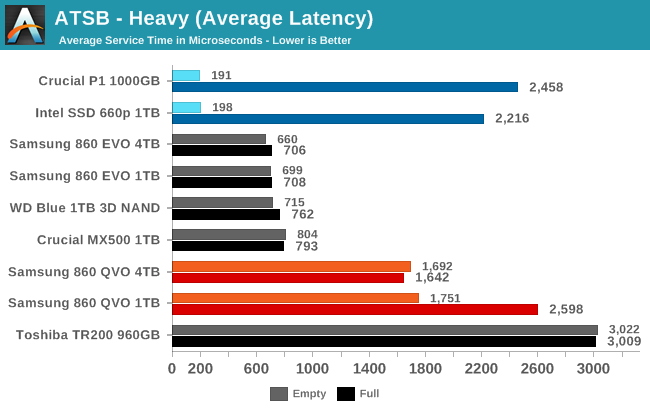
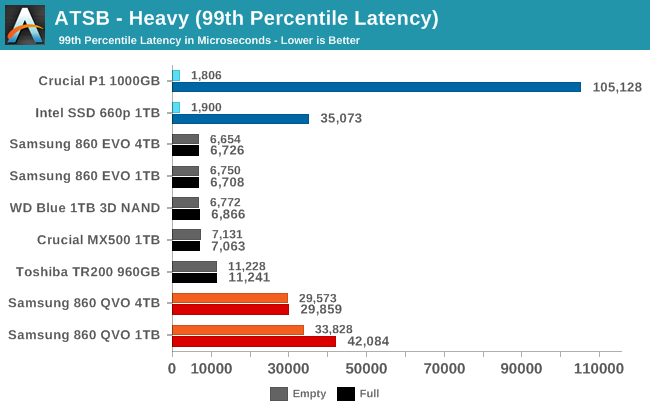
The Samsung 860 QVOs have much worse latency scores than the mainstream TLC drives, and the 99th percentile latency is much worse than even the DRAMless TLC SSD. However, the Samsung QLC drives are a bit better than the Intel/Micron QLC drives at keeping latency under control when the test is run on a full drive.
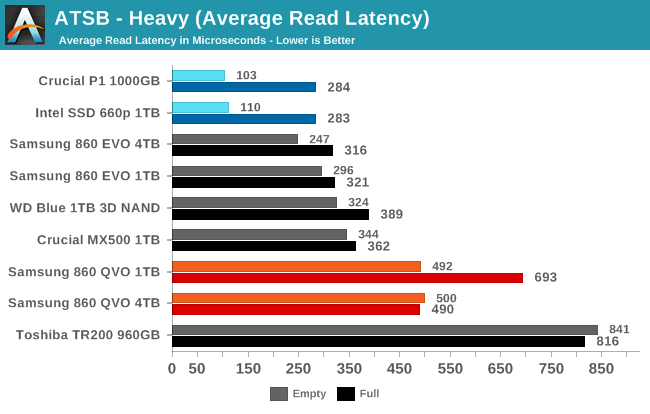
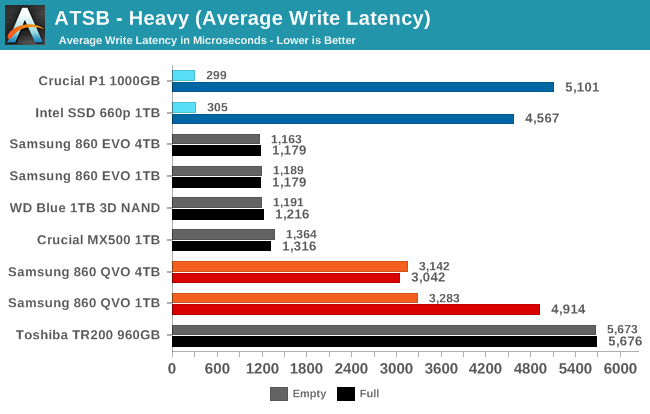
The average read latencies from the Samsung 860 QVOs are only a bit higher than the mainstream TLC drives, but the average write latencies stand out as worse by at least a factor of two.
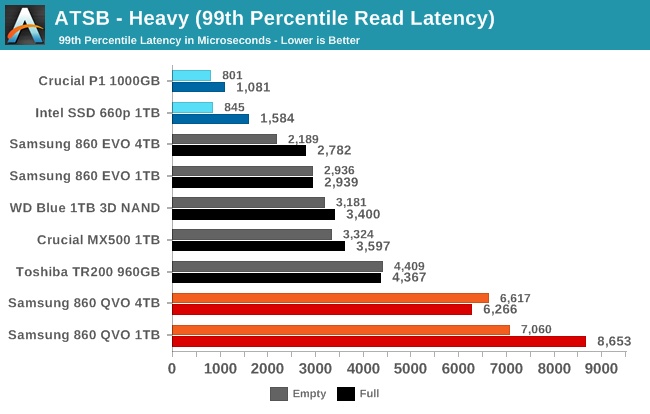
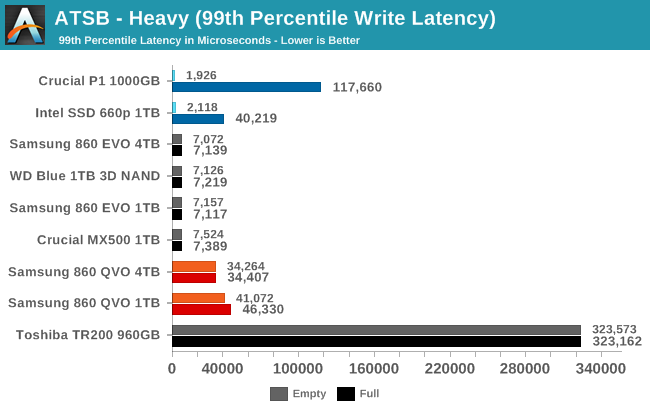
The 99th percentile read and write latency scores from the 860 QVOs are poor, but they at least avoid the horrific write QoS issues that the Toshiba TR200 shows, and are better than the full-drive run on the Crucial P1.
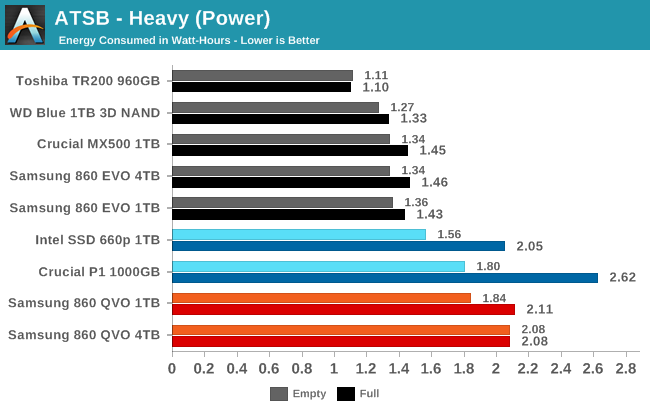
The Samsung 860 QVO uses substantially more energy over the course of the Heavy test than the other SATA drives, and more than the the NVMe QLC drives in most cases, too.










109 Comments
View All Comments
Morawka - Wednesday, November 28, 2018 - link
I just had 2 Samsung QLC 3 bit drives die this year alone. They were less than 1.5 year old. I'm never buying Samsung's EVO line again. It will be Pro from here on out. 4 bit drives will fail even faster.Makaveli - Wednesday, November 28, 2018 - link
Which model evo's were those Morawka?And how many writes did they see? what kind of environment did you have them in?
stephenbrooks - Wednesday, November 28, 2018 - link
I was starting to get excited about 2TB for $300 but then I looked up 2TB HDDs and they're about $60. Still a huge price differential especially as I usually want at least one extra drive for nightly backups, although perhaps the backup drive could be the HDD?Lolimaster - Thursday, November 29, 2018 - link
Even with the right capacities for a QLC price is similar or worse than current TLC.Samsunf 860 EVO 1TB $127
For QLC to make sense it should HALF of a TLC else is a ripoff.
s.yu - Friday, November 30, 2018 - link
What's the point of trying to pronounce it? It's just Q-V-O!araczynski - Friday, November 30, 2018 - link
so basically next black friday these should be half price and the 4tb might be worthy of consideration as a Steam drive.thomas-hrb - Friday, November 30, 2018 - link
$149.99 launch price is encouraging even if it is currently more than the 860evo. The 860evo launched for over $300 (closer to $330) and is now $139. If the qvo follows this pattern we can look forward to sub $65 for the 1tb qvo and maybe even $250 for 4tb.Ankou - Friday, November 30, 2018 - link
I think these QLC drives are a bad idea especially in the way they're being marketed. I'm not even talking about performance, the speed reduction I could live with. However, they're orders of magnitude worse in P/E cycles, retention, and endurance. These manufacturers know this and they're preying on the lack of education and focusing on price. Even so far as advertising these drives (this one in particular) as using 4 bit MLC memory (which 4 bit MLC is *always* QLC) implying that it is on safer MLC memory:https://news.samsung.com/global/samsung-electronic...
That is completely a scummy marketing/PR way of doing business.
s.yu - Saturday, December 1, 2018 - link
The fundamental issue is that 2-bit MLC should have been accurately named DLC in the first place, it's not like somebody's gonna mix that up with downloadable content.0ldman79 - Saturday, December 15, 2018 - link
Could we get some numbers from some mechanical drives, WD or Seagate 1TB or 2TB, in comparison to the slower QLC drives?I'd like to see how they hold up against the QLC in random and sustained reads/writes. The latency might be the deciding factor even though I've got some mechanical drives that can beat them on sustained reads/writes.